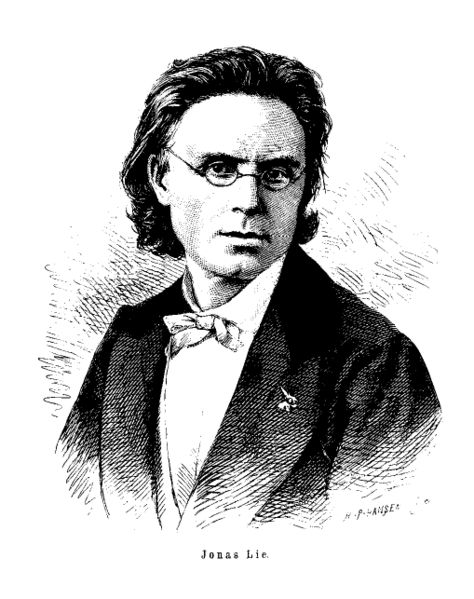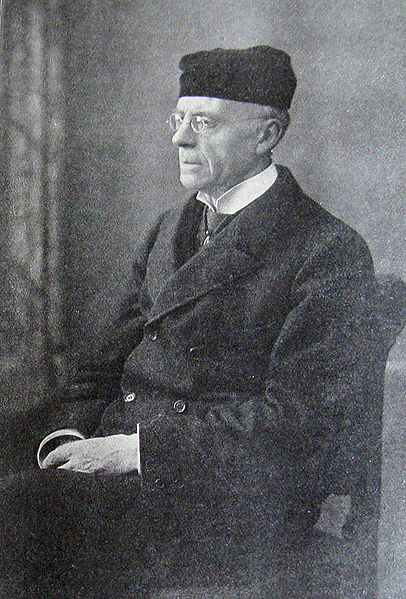<Back to Index>
- Inventor Johann Alois Senefelder, 1771
- Writer Jonas Lauritz Idemil Lie, 1833
- Président de la République Française Clément Armand Fallières, 1754
PAGE SPONSOR


Jonas Lauritz Idemil Lie (6 November 1833 – 5 June 1908) was a Norwegian novelist, poet, and playwright who is considered to have been one of the Four Greats of 19th century Norwegian literature, together with Henrik Ibsen, Bjørnstjerne Bjørnson, and Alexander Kielland.
Jonas Lie was born in Modum in Eiker, Buskerud county, in southern Norway. Five years after his son's birth, Lie's father was appointed sheriff of Tromsø, which lies within the Arctic Circle, and young Jonas Lie, spent six of the most impressionable years of his life at that remote port.
He was sent to the naval school at Fredriksværn; but his defective eyesight caused him to give up a life at sea. He transferred to the Bergen Cathedral School (Bergen katedralskole) in Bergen, and in 1851 entered the University of Christiania, where he made the acquaintance of Ibsen and Bjørnson. He graduated in law in 1857, and shortly afterwards began to practice at Kongsvinger, a town located between Lake Mjøsa and the border with Sweden.
Clients
were not numerous at Konsvinger and Lie found time to write for the
newspapers and became a frequent contributor to some of the Christiania journals.
His first work was a volume of poems which appeared in 1866 and was not
successful. During the four following years he devoted himself almost
exclusively to journalism, working hard and without much reward, but
acquiring the pen of a ready writer and obtaining command of a style
which has proved serviceable in his subsequent career. In
1870 he published Den
Fremsynte ("The
Visionary or Pictures From Nordland"), a powerful tale of the sea and
northern superstitions. In the following year he revisited Nordland and
traveled into Finnmark. Starting
from 1874, the Norwegian Parliament had granted him an artist salary.
Having obtained this small pension from the Government, he sought the
greatest contrast he could find in Europe to the scenes of his
childhood and started for Rome. For a time he lived in North Germany,
then he migrated to Bavaria, spending his winters in Paris.
In 1882 he visited Norway for a time, but returned to the continent of
Europe. His voluntary exile from his native land ended in the spring of
1893, when he settled at Holskogen, near Kristiansund. His works were numerous after that. Jonas
Lie often sought to reflect in his writings the
nature, folk life, and social spirit of the nation of Norway. His
writing often dealt with family life in diverse settings, including
portraying the social and intellectual restrictions on women of the
educated classes. Lie was a versatile writer, liberal and modern, but
also a strong tradition bound. Among
Lie's finest works must be considered Familien
paa Gilje ("The
Family at Gilje: A Domestic Story of the Forties"), which was a
striking document of the life of an officer's family, and the few
options given to the daughters of such families. His two collections of short stories
called Trold involve the superstitions of the
fishermen and coast commoners of northern Norway. The much anthologized
short story Elias and the Draugh was included in a collection originally
published by Gyldendal
Norsk Forlag, and was
reprinted by Roald
Dahl in Roald Dahl's Book of Ghost Stories (1983). In
1904, The king of Norway awarded Lie with the Grand Cross of the Order of St.
Olav.
In 1860, he married his cousin Henriette Thomasine Lie, (1833 - 1907).
The couple had five children, of whom two died young. Jonas Lie died at
Fleskum at Sandvika during 1908, less than a year
after the death of Thomasine. They
were the parents of Norwegian author and cultural historian, Erik Lie
(1868 - 1943). Jonas Lie was the uncle of the author Bernt Lie
(1868 - 1916) . Henriette Thomasine Lie was the aunt of Jonas
Lie, the Norwegian-born
American painter.